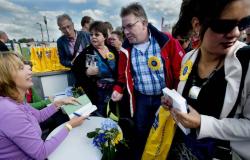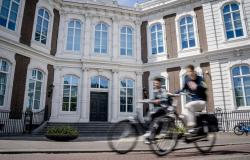
FDF and Agractie were severely disappointed on Friday morning with the outcome of the manure debate on Thursday. They both believe that the plans of Adema and the dairy cattle parties do not solve the acute manure problem. LTO sees an opportunity to discuss the move to Brussels with the minister. Read their responses below.
FDF director Sieta van Keimpema is at Schiphol on Friday morning when she answers the phone. Together with other (regional) administrators, she is on her way to Valencia to consult with other international farmers’ organizations about the protest action planned for June 4. According to her, this is desperately needed, now that the House has supported the fertilizer plan of Adema and the four sector parties. She is not happy with the outcome of the debate. “The measures that the minister proposes in his plan do not help to solve the acute manure problem. The only thing that will help is to introduce a transitional arrangement and, in the long term, to adjust the Nitrate Directive. That is also possible, because there is no scientific basis for it.”
Vulnerable area
FDF itself presented a proposal for this in mid-April, which is legally substantiated and has been reviewed with a lawyer. “In the Netherlands, 97 percent of derogation companies already meet the standard of 50 milligrams from the European Nitrate Directive,” says the FDF spokesperson.
The government should therefore not designate our entire country as a ‘vulnerable area’, which requires generic policy, but should use an exception offered by the Nitrate Directive to apply more tailor-made solutions. “Member States are exempt from the obligation to determine specific vulnerable zones if, in accordance with this Directive, they draw up action programs referred to in Article 5 and apply them throughout their territory,” the FDF proposal states.
Don’t create false hope
FDF has discussed this plan with BBB, PVV and SGP. André Flach (SGP) and Cor Pierik (BBB) asked the minister during the manure debate whether there is room to apply this option, but their request was rejected. Flach, for example, referred to the Northern Netherlands, where there is a lot of grassland and the water quality is therefore better.
The minister indicated that he has already investigated and discussed this in Brussels, but that only the river area would be considered, because the higher flow keeps the water less polluted. “If you abandon all standards in a non-vulnerable area, the water will still be polluted in no time. That is why the whole of the Netherlands has been classified as a vulnerable area.”
With the arrival of the goals from the Water Framework Directive (WFD), this task is even more difficult, Adema added later. “So I don’t want to give farmers false hope that this is a solution. First we must implement the measures so that water quality improves. Only then can we talk about such things again.”
The fact that the minister does not want to investigate this further and only wants to talk to the four farmers’ organizations that have submitted a plan says a lot, according to Van Keimpema. “The minister is again dividing and conquering, just like in December when he blamed the farmers from the south for the lack of an agricultural agreement. He’s just a sore loser. He has not achieved anything as a minister and now he wants to push through this plan without the mandate of the sector. Many other organizations do not support the plan of LTO and others. I’m curious, because there is no money, just like with the agricultural agreement. This plan does not help at all to improve water quality and solve the manure problem.”
Conversation at the ministry
Flach did submit a motion requesting the outgoing cabinet to urge Brussels not to designate the entire Netherlands as a vulnerable area within the European Nitrate Directive and not to designate unpolluted areas with a lot of grassland and few water quality areas as vulnerable. including at least the river area.
Adema asked whether Flach would like to defer the motion and come for coffee at the Ministry of Agriculture, Nature and Food Quality to discuss the contents further. The SGP member accepted the invitation. He therefore deferred the motion. In addition, the minister will soon send a letter to Parliament with a technical explanation about the designation of vulnerable areas. However, the minister warned, that will not change his position that this is not an option for the short term. “First we have to deliver.”
Follow-up
Another point that Van Keimpema does not understand is that there is a fear of European and national legal procedures if the Netherlands introduces a transitional arrangement and tolerance policy. FDF considers this a non-argument and found out that the Netherlands had to deal with a notice of default procedure 70 times in ten years and that a fine almost never resulted. “That fear is therefore not necessary at all,” says Van Keimpema.
FDF is considering what to do next. “Farmers should in any case be less supportive of LTO, because the measures in their naive proposal are now being adopted by the minister and Adema is leaving the transitional arrangement for what it is. The current Nitrate Directive, without scientific substantiation, is the death knell for the sector.”
Agractie: ‘You have to open the derogation decision if you want to prevent a cold reorganization’
Agractie believes that the only solution for the short term is to suspend the derogation reduction, says vice-chairman Alien van Zijtveld. “We must return to the situation in 2022. A new cabinet can then quickly get to work on going to Brussels with a good and well-founded ‘full package’, as the Commission asks of us.” This should then include scientifically well-substantiated proposals for good soil management, for example, van Zijtveld mentions.
No support within the cabinet
A majority in the House of Representatives appears to be in favor of Adema’s plans. Agractie Nederland doesn’t understand that. “These plans do not solve anything in the short term and pile up even more restrictions for entrepreneurs on the farm. In addition, we think it is a wasted effort to send Minister Adema to Brussels again. There is no support within the current outgoing cabinet to deviate from shrinkage. This is also reflected in the action programs, the NPLG and the current derogation decision.”
Agractie, like FDF, also thinks it is a shame that the minister only wants to talk to LTO, NAJK, etc. Van Zijtveld: “We think that is really childish. With statements like this, he has been demoted to the level of a kindergarten class. Unworthy of a minister.”
Tolerance decision
Van Zijtveld maintains that taking a tolerance decision or revising the derogation decision are the only options for the short term. They also sent a letter to the Ministry of Agriculture, Nature and Food Quality for this purpose. Agractie is still waiting for a response, but already knows the answer: that nothing will be possible. “Toleration is the only proposal that prevents cold restructuring in the short term. He doesn’t want to, but it is certainly possible. The rest of his proposals will take at least a year or more before they will have an effect on the fertilizer market.”
According to Van Zijtveld, the risk that legal proceedings will follow is disproportionate to the consequences of the current plans for the sector. “You have to break open the derogation decision if you want to prevent cold restructuring. There is no room within the current derogation decision. I do have doubts as to whether the minister’s consequences are clear, but of course I cannot look into his head.”
According to LTO Netherlands, the manure debate proves that the approach to the manure crisis must be different.
LTO chairman Ger Koopmans looks back: “If the debate yielded one insight, it is that a cold restructuring can only be prevented if the European Commission makes a concession on the path to phasing out the derogation.” Koopmans also sees an opportunity there: “The The minister has promised for the first time that he is prepared to enter into renewed discussions with the European Commission. I would like to discuss with the government the momentum at which that conversation will take place.”
Koopmans calls it inevitable that the (current or next) cabinet will return to Brussels: “That cannot wait a year, this must happen faster. The minister will send a timetable to the House of Representatives within a few weeks. If we want to prevent an important part of the sector from falling into this ‘gap’, a trip to Brussels will have to be part of this. This problem cannot be solved without a concession from Brussels.”
These statements are special, because the minister clearly indicated during the debate that there is no room in Brussels in the short term and that a conversation is therefore pointless. The Netherlands must first implement the measures and demonstrate that they have an effect on water quality. In the long term there might be room for a discussion about a new derogation decision.
Also on Friday morning, an Adema spokesperson maintained that there was no room in Brussels in the short term. “This is an interpretation of LTO.”
Tags: FDF Agractie heavily disappointed Chamber cabinet manure debate LTO sees opportunity VeeenGewas .nl





